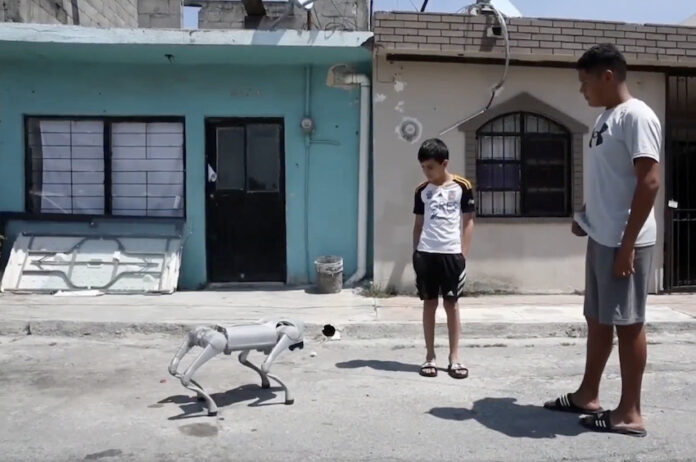A four-legged robot dog spotted recently on the streets of the Monterrey metropolitan area doesn’t bite, slobber or make messes on the sidewalk.
Rather, the robotic Waldog captivates residents while championing animal welfare with a distinctly metallic bark.
@nbcnews An AI-powered robot #dog named “Waldog,” is making the rounds in the Monterrey, #Mexico to raise awareness about #animal ♬ original sound – nbcnews
Sporting a beagle-like build and equipped with artificial intelligence, Waldog patrols neighborhoods, drawing the attention of children and adults wherever he roams. (Reuters and other news outlets use male pronouns when referring to Waldog.)
His mission is to speak up on behalf of real canines, and to promote adoption and respect for all species.
“Hi, I’m Waldog, and I’m here to give a voice to those who don’t have one, the little animals who live on the streets,” the automaton said in Spanish to a group of smiling residents during his official debut in the Santa Catarina neighborhood last week.
The brainchild of federal Sen. Waldo Fernández González, an animal rights advocate from Monterrey, the capital of Nuevo León, Waldog represents a fusion of technology and activism seldom seen in public spaces.
Hoy recorrí Santa Catarina acompañado de “Waldog”, un perro robot con inteligencia artificial que adoptamos simbólicamente para lanzar una campaña de concientización sobre el bienestar animal. pic.twitter.com/RHNgCR8aRN
— Waldo Fernández (@FdzWaldo) July 4, 2025
Fernández — who reportedly used his own money to purchase the robot for about US $4,000 — named the “pet” as a play on his own name. He operates the device via remote control.
“The main objective of innovation should be to build better solutions for common problems,” Fernández said. “In that sense, animal welfare is an issue that is currently one of people’s main concerns, but one that we sometimes don’t know how to solve. With Waldog, we want to reach new generations, build community and foster a culture of care and responsibility.”
Fernández, 54, was elected to a six-year term, his first, in the Mexican Senate last year, and now, according to media reports, has his sights set on becoming the governor of Nuevo León in the 2027 elections, or, failing that, the mayor of Monterrey.
In that regard, perhaps Waldog is something of a public-relations gimmick — but few believe he’s just a showpiece.
As Fernández has explained, the robot dog can identify litter and potholes on Monterrey’s streets, check on other stray dogs and help register them, and interact directly with people through a friendly voice and advanced recognition systems.
He can also easily stand up on his hind legs, and he even has his own Instagram account and Facebook page.
Sorprende el #WalDog a estudiantes en ciudad universitaria, lo veremos con la playera de rayados próximamente @FdzWaldo ? pic.twitter.com/0cXN49Scld
— @QuePasaEnNL ®️ (@LoQuePasaEnNL) July 31, 2025
Since early July, before his official unveiling last week, he had been making short appearances here and there, including “My first visit to the Senate of the Republic,” which Waldog himself posted to Instagram on July 29.
His tech pedigree is impressive: The Unitree Go2 PRO, a model from Chinese robotics firm Unitree, gives Waldog cutting-edge autonomy, thanks to 4D L1 LIDAR that enables 360-degree navigation and remote operation from up to 100 meters away.
In one symbolic gesture to spark responsible pet adoption, Waldog was even “adopted” by a local veterinarian during his debut.
Fernández said he plans to deploy Waldog at schools, plazas and working-class neighborhoods across the Monterrey metro area — all with the hope of inspiring empathy, responsible ownership and community care for animals.
The senator’s Waldog campaign arrives as robotic dogs gather attention worldwide for their versatile roles.
In addition to activism, similar robots are used in search and rescue operations and are being developed by U.S. authorities for border patrol between the United States and Mexico.
Waldog’s packed schedule includes dozens of planned neighborhood visits and, of course, ample time posing for selfies with new friends.
With reports from Reuters, Infobae, ABC Noticias and Aristegui Noticias
